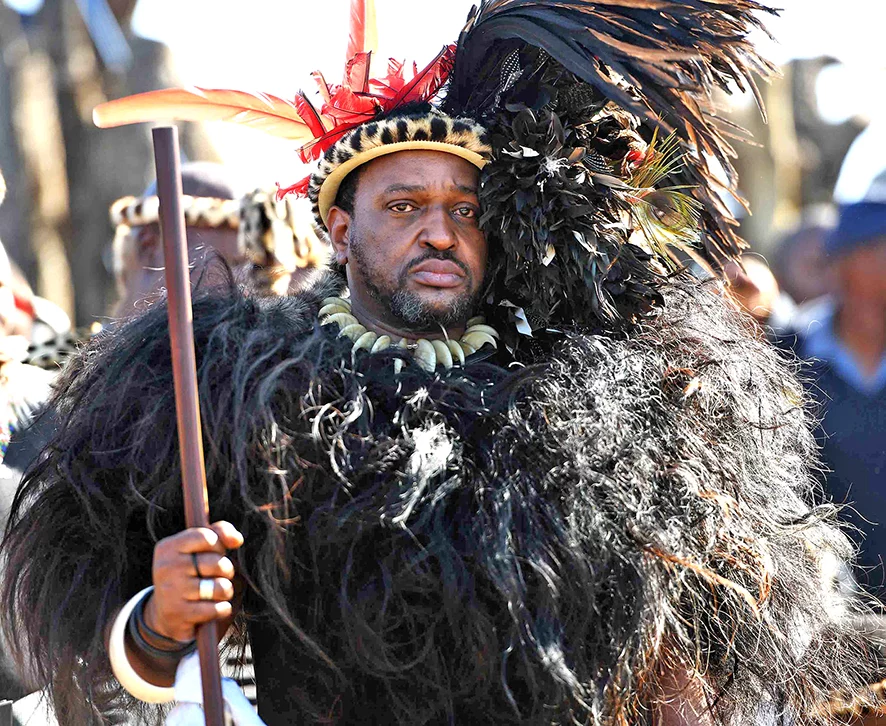AmaZulu King Misusulu KaZwelithini walked into the Isandlwana hill on Wednesday with his shoulders heavily burdened by several controversies around him.
Together with his fiancé Nomzamo Myeni, the monarch, who succeeded his late father King Goodwill Zwelithini KaBhekuZulu, attended the Battle of Isandlwana in front of a sizable crowd of amabutho and other dignitaries and government officials.
The ceremony, which is held in eNquthu on the far northern KwaZulu-Natal, is one of the key events in the AmaZulu royal house.
Even after the king announced that he had cancelled his marriage to MaMyeni and she withdrew her guards, the two seemed to be in a good mood and presented a united front.
As was the case during the last commemoration, it was expected that the king would announce the next traditional prime minister to the nation.
But it wasn’t to be. Instead, the king said he would be going back to seclusion, supposedly to seek guidance from his forefathers.
King avoids talking about key issues
It was the king’s first public appearance since he won a case in which his estranged wife, Queen Ntokozo KaMayisela, urgently petitioned the court to prevent the king’s upcoming weddings to MaMyeni.
“That time has not come for the king to speak on issues of the nation. Right now, I am only speaking on internal issues,” the king said.
“The time has not come for me to speak on that until the burning of the log [ukusha kothi ceremony].”
In addition, he avoided talking about other domestic matters, such as whether he would marry his fiancé.
Additionally, it was anticipated that he would have a say in the matter of Ithala Bank, a financial institution based in KZN that has been targeted by the prudential authority of the Reserve Bank, which has applied for its liquidation.
Instead, the king informed his subjects that on February 12 he would come out of seclusion.
The removal of Reverend Thulasizwe Buthelezi left open the crucial role of the traditional prime minister, who is regarded as the king’s second-in-command.
A number of names have been suggested as potential substitutes, including MK Party senior leader Inkosi Phathisizwe Chiliza, who is currently the deputy traditional prime minister; Prince Vanana Zulu, a trusted king lieutenant; and ANC strongman Zweli Mkhize.
Significant chapter in SA’s history
In the meantime, the battle that occurred 146 years ago on January 22, 1879, was fought on the unique-shaped hill known as Isandlwana, or “holy mountain”.
With only cowhide shields and spears, the Zulu regiments (amabutho) led by King Cetshwayo kaMpande defeated heavily armed British troops who had brought their machine guns prepared for battle.
This event became a significant chapter in South African history.
Premier of KwaZulu-Natal Thami Ntuli, who was one of the high-ranking government representatives present, said the celebration was a chance to honour the Zulu warriors’ valour and strategic intelligence, whose victory had an impact well beyond the battlefield.
“The Battle of Isandlwana stands as a testimony to the resilience and military prowess of the Zulu nation,” Ntuli said.
“By commemorating this event, we pay tribute to the legacy left behind by our forebears and deepen our appreciation for the cultural richness of our province.”
The endearing scenery of the white painted stones, which are the actual graves of the fallen British soldiers in the foothills of the mountains, still serves as a constant reminder of the battle.
According to historians, when the war finally subsided, the soil turned red while lifeless bodies of men lay on the ground.



